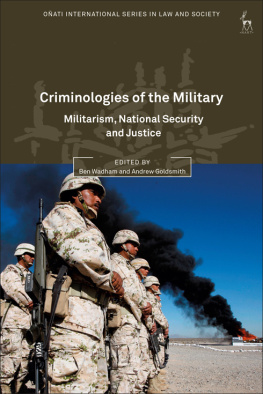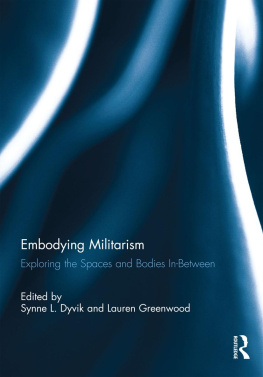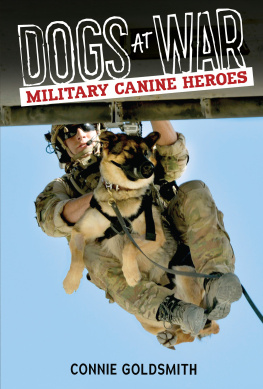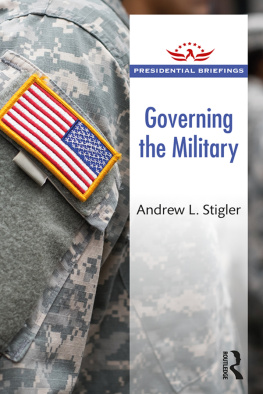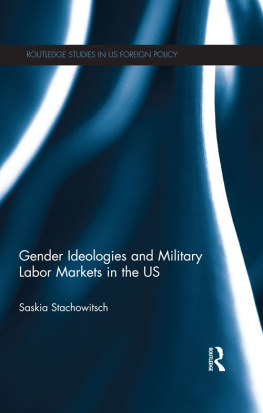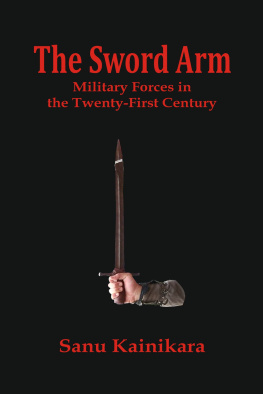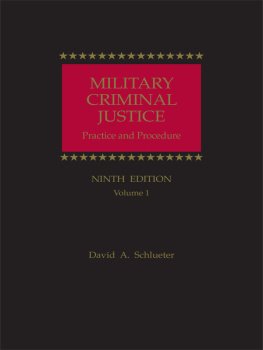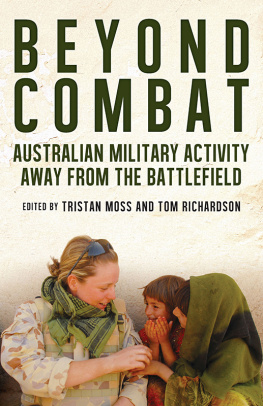Contents

CRIMINOLOGIES OF THE MILITARY
This innovative collection offers one of the first analyses of criminologies of the military from an interdisciplinary perspective. While some criminologists have examined the military in relation to the area of war crimes, this collection considers a range of other important but less explored aspects such as private military actors, insurgents, paramilitary groups and the role of military forces in tackling transnational crime. Drawing upon insights from criminology, this books editors also consider the ways the military institution harbours criminal activity within its ranks and deals with prisoners of war. The contributions, by leading experts in the field, have a broad reach and take a truly global approach to the subject.
Oati International Series in Law and Society
A SERIES PUBLISHED FOR THE OATI INSTITUTE
FOR THE SOCIOLOGY OF LAW
General Editors
Rosemary HunterDavid Nelken
Founding Editors
William L F FelstinerEve Darian-Smith
Board of General Editors
Carlos Lugo, Hostos Law School, Puerto Rico
Jacek Kurczewski, Warsaw University, Poland
Marie-Claire Foblets, Leuven University, Belgium
Ulrike Schultz, Fern Universitt, Germany
Recent titles in this series
Womens Rights to Social Security and Social Protection
Edited by Beth Goldblatt and Lucie Lamarch
Delivering Family Justice in the 21st Century
Edited by Mavis Maclean, John Eekelaar and Benoit Bastard
Regulatory Transformations
Rethinking Economy-Society Interactions
Edited by Bettina Lange, Fiona Haines and Dania Thomas
Life Imprisonment and Human Rights
Edited by Dirk van Zyl Smit and Catherine Appleton
Trust in International Police and Justice Cooperation
Edited by Saskia Hufnagel and Carole McCartney
Human Rights Encounter Legal Pluralism
Edited by Eva Brems, Giselle Corradi and Mark Goodale
Transitional Justice and the Public Sphere: Engagement,
Legitimacy and Contestation
Chrisje Brants and Susanne Karstedt
Law and the Precarious Home: Socio Legal Perspectives
on the Home in Insecure Times
Edited by Helen Carr, Brendan Edgeworth and Caroline Hunter
For the complete list of titles in this series, see
Oati International Series in Law and Society link at
www.bloomsburyprofessional.com/uk/series/
onati-international-series-in-law-and-society
Criminologies of the Military
Militarism, National Security and Justice
Edited by
Ben Wadham and Andrew Goldsmith
Oati International Series in Law and Society
A SERIES PUBLISHED FOR THE OATI INSTITUTE
FOR THE SOCIOLOGY OF LAW

The editors would like to acknowledge the support of the Flinders Centre for Crime Policy and Research throughout the project, from conception, through to the organization of the Onati workshop, and afterwards in relation to the completion of the manuscript. In addition, the editors want to thank the following persons for their various roles in assisting with research, collation, and editing of the chapters: Deb McBratney, Melissa De Vel-Palumbo, and Julie-Anne Toohey.
Willem de Lint
Professor of Criminology, College of Business, Government and Law, Flinders University, South Australia
Cornelius Friesendorf
Lecturer, Cluster of Excellence, Goethe University, Frankfurt, Germany
Andrew Goldsmith
Matthew Flinders Distinguished Professor, Director, Centre for Crime Policy & Research, Flinders University, South Australia
Mark Halsey
Professor of Criminology, College of Business, Government and Law, Flinders University, South Australia
Gernot Klantschnig
Senior Lecturer, University of York, York, United Kingdom
Ross McGarry
Senior Lecturer, Department of Sociology, Social Policy and Criminology, University of Liverpool, Liverpool, United Kingdom
Emma Murray
Senior Lecturer, School of Law, Liverpool John Moores University, Liverpool, United Kingdom
David Mutimer
Professor, Department of Political Science, York University, Toronto, Canada
Grant Niemann
Senior Lecturer, College of Business, Government and Law, Flinders University, South Australia
James Sheptycki
Professor, Criminology, York University, Toronto, Canada
Yorick Smaal
Research Fellow (ARC DECRA), Griffith University, Gold Coast, Queensland, Australia
Ben Wadham
Associate Professor, Centre for Crime Policy & Research, Flinders University, South Australia
Adam White
Senior Lecturer, Criminology, School of Law, The University of Sheffield, Sheffield, United Kingdom
Graham Willett
Honorary, Historical and Philosophical Studies, The University of Melbourne, Victoria, Australia
BEN WADHAM AND ANDREW GOLDSMITH
CRIME, CRIMINOLOGY AND THE MILITARY
T HE WESTERN WORLD has been engaged in sustained military activity since September 2001. While war and military operations have been, and continue to be, dominant landmarks on the historical landscape of the last century or so, the focus of attention on these issues from scholars in the social sciences has had a reasonably specific character. Research has tended to stem from strategic studies and international human rights rather than from detailed studies of changes in the ways militaries self-organise and operate in the field. Over this time we have seen militaries develop in size, organisation, professionalism, technology and extent of global engagement. In the same period, militaries and wars have become increasingly mediated through the mainstream media, and in more recent times, the burgeoning Internet and other forms of social media.
As institutions, militaries have become decreasingly closed off to external influence. In various ways the idea of a civilmilitary separation has been challenged by changes in broader governance arrangements. For example, in recent years civic accountability and machineries of governance have infiltrated the military, often in response to scandals within one or other of the services (army, navy, air force). Alongside changes in conventional military structures, there have been signs of more diffuse changes.
Militarism, in the sense of a particular mentality or lens that promotes a military orientation to the world, has become increasingly evident and taken a variety of forms. Greater economic liberalisation, including the tendency for governments to outsource key functions, has led, for example, to the proliferation of private military companies and the emergence of private military and security contractors (Uessler, 2008). The new wars phenomenon (Kaldor, 1999) and the strategic focus within international security analyses upon the problems associated within so-called failed or failing states, has meant that as militaries focus more upon intra-state issues, issues of national security have increasingly assumed a domestic focus. The phenomenon of lone wolf terrorism has reminded many of us that militarism is something we face on our own streets and in our own neighbourhoods; it is not something that happens just to others in faraway places. It is a feature of those who would attack us at close quarters as well as those who attack our troops (Hamm and Spaaij, 2017). In such environments, away and at home, there are often few bright lines to be drawn between warring parties and criminal groups, or between military combatants, criminals and local residents.

